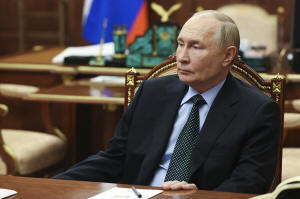Moscow warns the US over allowing Ukraine to hit Russian soil with
longer-range weapons
 Send a link to a friend
Send a link to a friend
 [November 19, 2024]
By ILLIA NOVIKOV and SAMYA KULLAB [November 19, 2024]
By ILLIA NOVIKOV and SAMYA KULLAB
KYIV, Ukraine (AP) — The Kremlin warned Monday that President Joe
Biden’s decision to let Ukraine strike targets inside Russia with
U.S.-supplied longer-range missiles adds “fuel to the fire” of the war
and would escalate international tensions even higher.
Biden’s shift in policy added an uncertain, new factor to the conflict
on the eve of the 1,000-day milestone since Russia began its full-scale
invasion in 2022.
It also came as a Russian ballistic missile with cluster munitions
struck a residential area of Sumy in northern Ukraine, killing 11 people
and injuring 84 others. Another missile barrage sparked apartment fires
in the southern port of Odesa, killing at least 10 people and injuring
43, Ukraine’s Interior Ministry said.
Washington is easing limits on what Ukraine can strike with its
American-made Army Tactical Missile System, or ATACMs, U.S. officials
told The Associated Press on Sunday, after months of ruling out such a
move over fears of escalating the conflict and bringing about a direct
confrontation between Russia and NATO.
The Kremlin was swift in its condemnation.
“It is obvious that the outgoing administration in Washington intends to
take steps, and they have been talking about this, to continue adding
fuel to the fire and provoking further escalation of tensions around
this conflict,” spokesman Dmitry Peskov said.

Russia's U.N. Ambassador Vassily Nebenzia went further at a U.N.
Security Council meeting marking 1,000 days of war, saying Moscow is
“astounded” that the leaders of Britain and France "are eager to play
into the hands of the exiting administration and are dragging not just
their countries but the entire Europe into large-scale escalation with
drastic consequences."
The scope of the new firing guidelines isn’t clear. But the change came
after the U.S., South Korea and NATO said North Korean troops are in
Russia and apparently are being deployed to help Moscow drive Ukrainian
troops from Russia’s Kursk border region.
Biden’s decision almost entirely was triggered by North Korea's entry
into the fight, according to a U.S. official who spoke on condition of
anonymity to discuss internal deliberations, and was made just before he
left for the Asia-Pacific Economic Cooperation summit in Peru.
Russia also is slowly pushing Ukraine’s outnumbered army backward in the
eastern Donetsk region. It has also conducted a devastating aerial
campaign against civilian areas in Ukraine.
Peskov referred journalists to a statement from President Vladimir Putin
in September in which he said allowing Ukraine to target Russia would
significantly raise the stakes.
It would change “the very nature of the conflict dramatically,” Putin
said at the time. “This will mean that NATO countries — the United
States and European countries — are at war with Russia.”
Peskov claimed that Western countries supplying longer-range weapons
also provide targeting services to Kyiv. “This fundamentally changes the
modality of their involvement in the conflict,” he said.
Putin warned in June that Moscow could provide longer-range weapons to
others to strike Western targets if NATO allowed Ukraine to use its
allies' arms to attack Russian territory. After signing a treaty with
North Korea, Putin issued an explicit threat to provide weapons to
Pyongyang, noting Moscow could mirror Western arguments that it’s up to
Ukraine to decide how to use them.
“The Westerners supply weapons to Ukraine and say: ‘We do not control
anything here anymore and it does not matter how they are used,’" Putin
has said. "Well, we can also say: ‘We supplied something to someone —
and then we do not control anything.’ And let them think about it.”

Putin has also reaffirmed Moscow’s readiness to use nuclear weapons if
it sees a threat to its sovereignty.
Biden's move will “mean the direct involvement of the United States and
its satellites in military action against Russia, as well as a radical
change in the essence and nature of the conflict,” Russia's Foreign
Ministry said.
President-elect Donald Trump, who takes office Jan. 20, has raised
uncertainty about whether his administration would continue military
support to Ukraine. He has also vowed to end the war quickly.
Ukrainian President Volodymyr Zelenskyy gave a muted response Sunday to
the approval that he and his government have request for over a year,
adding: "The missiles will speak for themselves.”
“The longer Ukraine can strike, the shorter the war will be,” Ukrainian
Foreign Minister Andrii Sybiha said Monday before the U.N. Security
Council meeting marking the 1,000th-day milestone.
[to top of second column]
|

Russian President Vladimir Putin listens to Moscow-appointed head of
Russian-controlled Zaporizhzhia region of Ukraine, Yevgeny Balitsky
during their meeting at the Kremlin in Moscow, Russia, Monday, Nov.
18, 2024. (Vyacheslav Prokofyev, Sputnik, Kremlin Pool Photo via AP)

Asked whether the United Kingdom would follow the United States in
authorizing use of its longer-range missiles, U.K. Foreign Secretary
David Lammy, who chaired the meeting, declined to comment. He said
doing so would risk “operational security and can only play into the
hands of Putin.”
France's U.N. Ambassador Nicolas De Riviere, whose country has also
given Ukraine longer-range missiles, told the Security Council
without directly saying what his country will do that “The right of
Ukraine to its legitimate defense includes the possibility of
striking military targets involved in operations aimed at the
territory.”
Ukraine's Sybiha said a green light from the U.S. to use
longer-range missiles against Russia “could be a game changer,” but
others are less certain.
ATACMS, which have a range of about 300 kilometers (190 miles), can
reach far behind the about 1,000-kilometer (600-mile) front line in
Ukraine, but they have relatively short range compared with other
types of ballistic and cruise missiles.
The policy change came “too late to have a major strategic effect,”
said Patrick Bury, a senior associate professor in security at the
University of Bath in the United Kingdom.
“The ultimate kind of impact it will have is to probably slow down
the tempo of the Russian offensives which are now happening,” he
said, adding that Ukraine could strike targets in Kursk or logistics
hubs or command headquarters.
Jennifer Kavanagh, director of military analysis at Defense
Priorities, agreed the U.S. move would not alter the war's course,
noting Ukraine "would need large stockpiles of ATACMS, which it
doesn’t have and won’t receive because the United States’ own
supplies are limited.”
On a political level, the move “is a boost to the Ukrainians and it
gives them a window of opportunity to try and show that they are
still viable and worth supporting” as Trump prepares to take office,
said Matthew Savill, director of Military Sciences at the Royal
United Services Institute in London.

The cue for the policy change was the arrival in Russia of North
Korean troops, according to Glib Voloskyi, an analyst at the CBA
Initiatives Center, a Kyiv-based think tank.
“This is a signal the Biden administration is sending to North Korea
and Russia, indicating that the decision to involve North Korean
units has crossed a red line,” he said.
Russian lawmakers and state media bashed the West for what they
called an escalatory step, threatening a harsh response.
“Biden, apparently, decided to end his presidential term and go down
in history as ‘Bloody Joe,’” lawmaker Leonid Slutsky told Russian
news agency RIA Novosti.
Vladimir Dzhabarov, deputy head of the foreign affairs committee in
the upper house of parliament, called it "a very big step toward the
start of World War III” and an attempt to “reduce the degree of
freedom for Trump.”
Russian newspapers offered similar predictions of doom. “The madmen
who are drawing NATO into a direct conflict with our country may
soon be in great pain,” Rossiyskaya Gazeta said.
Some NATO allies welcomed the move.
President Andrzej Duda of Poland, which borders Ukraine, praised the
decision as a “very important, maybe even a breakthrough moment“ in
the war.
“In the recent days, we have seen the decisive intensification of
Russian attacks on Ukraine, above all, those missile attacks where
civilian objects are attacked, where people are killed, ordinary
Ukrainians,” Duda said.
Easing restrictions on Ukraine was “a good thing,” said Foreign
Minister Margus Tsahkna of Russian neighbor Estonia.
“We have been saying that from the beginning — that no restrictions
must be put on the military support,” he told senior European Union
diplomats in Brussels. “And we need to understand that situation is
more serious (than) it was even maybe like a couple of months ago.”
But Slovakian Prime Minister Robert Fico, known for his pro-Russian
views, described Biden’s decision as “an unprecedented escalation”
that would prolong the war.
___
Associated Press reporters Matthew Lee in Washington, Lorne Cook in
Brussels, Danica Kirka in London, Hanna Arhirova in Kyiv, Edith M.
Lederer at the United Nations and Karel Janicek in Prague, Czech
Republic, contributed to this report.
All contents © copyright 2024 Associated Press. All rights reserved |